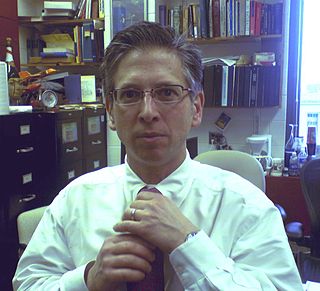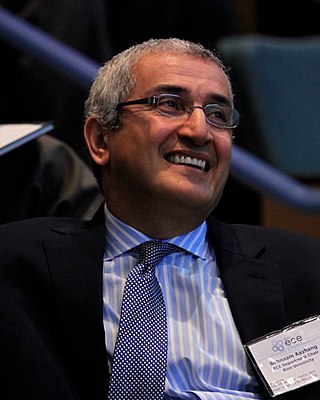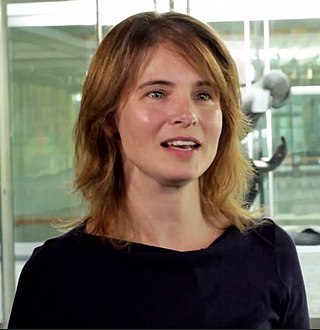
Leon N. Cooper is an American physicist and Nobel Prize laureate who, with John Bardeen and John Robert Schrieffer, developed the BCS theory of superconductivity. His name is also associated with the Cooper pair and the BCM theory of synaptic plasticity.

Stephen Byram Furber is a British computer scientist, mathematician and hardware engineer, and Emeritus ICL Professor of Computer Engineering in the Department of Computer Science at the University of Manchester, UK. After completing his education at the University of Cambridge, he spent the 1980s at Acorn Computers, where he was a principal designer of the BBC Micro and the ARM 32-bit RISC microprocessor. As of 2023, over 250 billion ARM chips have been manufactured, powering much of the world's mobile computing and embedded systems, everything from sensors to smartphones to servers.
Terrence Joseph Sejnowski is the Francis Crick Professor at the Salk Institute for Biological Studies where he directs the Computational Neurobiology Laboratory and is the director of the Crick-Jacobs center for theoretical and computational biology. He has performed pioneering research in neural networks and computational neuroscience.

Paul S. Weiss is a leading American nanoscientist at the University of California, Los Angeles. He holds numerous positions, including UC Presidential Chair, Distinguished Professor of Chemistry and Biochemistry, Bioengineering, and of Materials Science and Engineering, and founder and editor-in-chief of ACS Nano. From 2019–2014, he held the Fred Kavli Chair in NanoSystems Sciences and was the director of the California NanoSystems Institute. Weiss has co-authored over 400 research publications and holds over 40 US and international patents.
Emery Neal Brown is an American statistician, computational neuroscientist, and anesthesiologist. He is the Warren M. Zapol Professor of Anesthesia at Harvard Medical School and at Massachusetts General Hospital (MGH), and a practicing anesthesiologist at MGH. At MIT he is the Edward Hood Taplin Professor of Medical Engineering and professor of computational neuroscience, the associate director of the Institute for Medical Engineering and Science, and the Director of the Harvard–MIT Program in Health Sciences and Technology.
Bin He is a Chinese American biomedical engineering scientist. He is the Trustee Professor of the Department of Biomedical Engineering, professor by courtesy in the Department of Electrical and Computer Engineering, and Professor of Neuroscience Institute, and was the head of the department of Biomedical Engineering at Carnegie Mellon University. Prior, he was Distinguished McKnight University Professor of Biomedical Engineering and Medtronic-Bakken Endowed Chair for Engineering in Medicine at the University of Minnesota. He previously served as the director of the Institute for Engineering in Medicine and the Center for Neuroengineering at the University of Minnesota. He was the Editor in Chief of the IEEE Transactions on Biomedical Engineering and serves as the editor in chief of IEEE Reviews in Biomedical Engineering. He was the president of the IEEE Engineering in Medicine & Biology Society (EMBS) from 2009 to 2010 and chair of International Academy of Medical and Biological Engineering from 2018 to 2021.
Erkki Oja is a Finnish computer scientist and Aalto Distinguished Professor in the Department of Information and Computer Science at Aalto University School of Science. He is recognized for developing Oja's rule, which is a model of how neurons in the brain or in artificial neural networks learn over time.

Behnaam Aazhang is the J.S. Abercrombie Professor in Electrical and Computer Engineering at Rice University and Director of the Rice Neuroengineering Initiative.

Ravi V. Bellamkonda is an Indian-American biomedical engineer and academic administrator. Since 2021, he has served as Provost and Executive Vice President for Academic Affairs at Emory University in Atlanta, Georgia. Bellamkonda was previously Vinik Dean of the Pratt School of Engineering at Duke University.

John Philip Donoghue is an American neuroscientist; he is currently the Henry Merritt Wriston Professor of Neuroscience and Professor of Engineering at Brown University, where he has taught since 1984.

Michael Neil Shadlen is an American neuroscientist and neurologist, whose research concerns the neural mechanisms of decision-making. He has been Professor of Neuroscience at Columbia University since 2012 and a Howard Hughes Medical Investigator since 2000. He is a member of the Kavli Institute for Brain Science, a Principal Investigator at the Mortimer B. Zuckerman Mind Brain Behavior Institute and an elected member of the National Academy of Medicine and National Academy of Sciences.

Din Ping Tsai is a physicist known for his work in the fields of photonics. He is currently a Distinguished Professor at the National Taiwan University and Director of the Research Center for Applied Sciences, Academia Sinica. He has been President of Taiwan Information Storage Association (TISA) since 2015.
Conor Russomanno is an American entrepreneur, inventor, and public speaker, specializing in the development of advanced human-computer interfaces. He is the co-founder and CEO of OpenBCI, a company dedicated to open source innovation of brain-computer interface technologies. Russomanno has also served as an adjunct professor at Parsons School of Design and NYU Tisch School of the Arts, and as a Research Affiliate at the MIT Media Lab. In 2018, he was honored on the Forbes 30 Under 30 list in the category of Science. In April 2023, Russomanno delivered a TED Talk that featured a spectacular assistive technology BCI and AR demonstration to help a friend living with severe motor disabilities, Christian Bayerlein, fly a drone over the audience.

Kafui Dzirasa is an American psychiatrist and Associate Professor at Duke University. He looks to understand the relationship between neural circuit malfunction and mental illness. He was a 2019 AAAS Leshner Fellow and was elected Fellow of the National Academy of Medicine in 2021.
Patrick Lee Purdon is an American biomedical engineer whose research focuses on neuroscience, neuroengineering, and clinical applications. He holds the Nathaniel M. Sims Endowed Chair in Anesthesia Innovation and Bioengineering at Massachusetts General Hospital and is an associate professor of anaesthesia at Harvard Medical School. Purdon received his Ph.D. in biomedical engineering from Massachusetts Institute of Technology in 2005. His research in neuroengineering encompasses the mechanisms of anesthesia, Alzheimer’s disease and brain health, anesthesia and the developing brain, neural signal processing, and the development of novel technologies for brain monitoring. He has published over 90 peer-reviewed publications, is an inventor on 16 pending patents, and is a Fellow of the American Institute for Medical and Biological Engineering. Purdon has won many awards, including the prestigious National Institutes of Health Director’s New Innovator Award, and his work has been covered in the popular media, including programs on Radiolab and NPR.

Melina Elisabeth Hale is an American neuroscientist and biomechanist. She is the dean of the College and the William Rainey Harper Professor in the Department of Organismal Biology and Anatomy, at the University of Chicago.
Marla Beth Feller is the Paul Licht Distinguished Professor in Biological Sciences and Member of the Helen Wills Neuroscience Institute at the University of California, Berkeley. She studies the mechanisms that underpin the assembly of neural circuits during development. Feller is a Fellow of the American Association for the Advancement of Science, member of the American Academy of Arts and Sciences and member of the National Academy of Sciences.

The Robert J. & Nancy D. Carney Institute for Brain Science is a cross-departmental neuroscience research institute at Brown University in Providence, Rhode Island. The institute's core focus areas include brain-computer interfaces and computational neuroscience The institute also focuses on research into mechanisms of cell death with the interest of developing therapies for neurodegenerative diseases.
Michael Joshua Frank is a neuroscientist who has played a leading role in emerging field of computational psychiatry. He is currently the Edgar L. Marston Professor of Cognitive, Linguistic and Psychological Sciences at Brown University and Director of the Center for Computational Brain Science at Brown's Carney Institute for Brain Science. Other honors include: Kavli Fellow (2016), the Cognitive Neuroscience Society Young Investigator Award (2011), and the Janet T Spence Award for early career transformative contributions.

Duygu Kuzum is a Turkish-American electrical engineer who is a professor at the University of California, San Diego's Jacobs School of Engineering. She develops transparent neural sensors based on single-layer materials. She was awarded a National Institutes of Health New Innovator Award in 2020.












